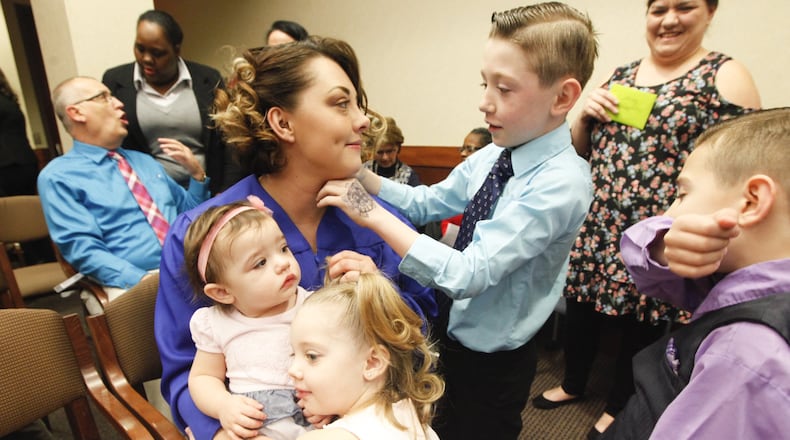“I don’t know where I’d be without this,” said Bostick, a Dayton mother of three. “When you go from being on drugs to living a different life, you need that support, that somebody is going to make you do the right thing every time. And as you’re struggling, you know that they will help you in any aspect of life, they helped me get where I needed to be.”
RELATED: New treatment court therapy aims to keep families intact
Montgomery County Juvenile Court Judge Anthony Capizzi told graduates that while they were the focus of the program, society benefits when families stay whole. As many as 65 percent of children removed from a home by Children Services are never returned, he said.
“These courts are different and unique. They cost a lot of money to manage and run. But the benefit is we can help individuals who have some drug challenges, help them survive and help them keep their children,” Capizzi said. “The goal is to keep that family together as long as you can, or if there is removal, get it back together as soon as we can.”
MORE: Montgomery County juvenile judge becomes president of national group
About 100 children have been affected by the 53 adults who have volunteered for the specialty docket, according to the court. As of last month, 10 children were able to return home and 16 have been able to stay in their homes during the four-phase program using customized case plans, regular urine tests, home visits and other aspects.
Tears rolled down Cierra Jett’s face as she stood in front of the crowd and listened to Montgomery County Juvenile Court Magistrate Nikole Xarhoulacos.
“You are proud, you are honest, you are creative, you are loved,” Xarhoulacos told her. “Cierra has been able to create a loving, safe, substance-free environment for her children, and she should be commended for that. I know you worked hard.”
The youngest two of Jett’s three children witnessed the graduation ceremony. Her 9-year-old daughter was in school – but is now back with her, too.
“Today is an accomplishment. It’s been a long journey,” Jett said. “I missed my children and I was broken … I couldn’t stop using drugs. My life was unmanageable. I heard about the program, and I wanted to get my kids back and I wanted to be better.”
RELATED: Ohio Chief Justice helps kick off county’s mental health court docket
Last year, Montgomery County Children Services received more than 10,000 child welfare calls and on any given day had 665 children in custody, according to the agency. Another 500 children are not in custody but receive in-home services.
The State of Ohio spends an estimated $45 million annually for placement costs of children due to parental use of drugs. Between 2009 and 2013, Montgomery County child welfare cases involving opioids more than doubled, climbing 132 percent, according to the county.
MORE: Drug crisis in Ohio: What solutions are making a difference?
Bethany Hampton was already in trouble with drugs and the law before she overdosed. Then Children Services became involved in her kids. Then she voluntarily entered the program that was then untried in Montgomery County.
“It started off pretty hopeless and bleak,” said Hampton, 28, who now lives in Xenia with her four children.
“It turned into an amazing adventure that finished off with getting my kids home and graduating from this program.”
Stories of hope
See Sunday’s Dayton Daily News for profiles of local people who have made their way into recovery from opioid addiction, as well as information on how to help.
About the Author

